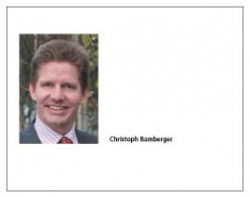University hospitals have a market value
Tours company opens a medical centre within a centre of excellence

University hospitals generally have immense medical knowledge, an excellent reputation and ample resources – but not money. This is a situation that cries for cooperation, and third parties, who lack that knowledge and reputation, can provide the latter. The marriage can prove highly successful, as experienced by the Hamburg-Eppendorf University Medical Centre.
Last April, the Medical Prevention Centre Hamburg GmbH & Co.KG (MPCH) opened its doors at the Hamburg-Eppendorf University Medical Centre (UKE). This new facility offers preventive medicine at the highest level, offering state-of-the-art diagnostic services, including whole-body MRI. ‘From a medical point of view, the MPCH differs from other so-called anti-aging hospitals in that it provides integrated and holistic prevention. Most other facilities focus on certain areas and cannot cover all prevention possibilities,’ said Professor Christoph Bamberger, Director of MPCH. Legally, the Centre is a public-private partnership between the UKE (49%) and Deutsche Seerederei Rostock (51%), with total funding supplied by the latter.
Why would a shipping company become involved in healthcare? The firm operates Arosa resorts and the Arosa fleet of cruise ships, which promise luxury vacations as well as a broad range of wellness and health-related services for the health conscious - the audience also targeted by MPCH. Information brochures and videos will point the Arosa client to services at the Prevention Centre.
The link with a university hospital is a valuable reference. UKE’s knowledge ensures constant top quality, as Professor Bamberger pointed out: ‘The scientific council of the Prevention Centre consists exclusively of members of the University Medical Centre, and this council defines and controls the medical programme of the prevention centre. So we ensure that our medical know-how is applied. Paramedical and questionable therapies have no place in the Prevention Centre.’
The concept is proving a success. According to the business plan, optimum utilization equals six clients daily - demand is already much higher. However, no additional appointments are made, so as not to compromise quality.
The Prevention Centre is not the only UKE successful venture. The Martini-Klinik is a private hospital and a 100% subsidiary of the UKE and is based at UKE. It focuses exclusively on diagnosis and therapy of prostate cancer. In its first year, the clinic provided surgery for 200 patients. The turnover - 2.4 million euros – met all expectations. To meet growing demand, in 2006 the number of beds was increased from nine to cover an estimated 17, 350 surgical interventions. Many patients come from the USA, and the Martini-Klinik plans to offer these clients a complete package, to include flight and hotel accommodation.
However, UKE emphasises that there is no danger that it might deviate from its top quality medical path ‘…just to make a quick buck’. No untested and non-validated therapies will be on offer. ‘After all, the reputation – the capital of the institution – is at stake,’ UKE concluded.
16.11.2006





